
Church Organs
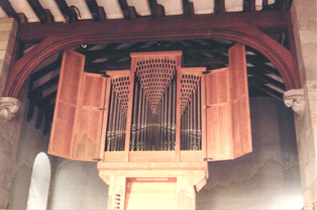
Dalmeny Kirk
Our first church organ was installed in Dalmeny Kirk, a Norman church one mile south of the Forth Road Bridge, near Edinburgh. It's specification comprises 5 stops with a permanently coupled pedalboard.
The action follows the French concept of "Le Mechanique Suspendu" (see article in 'The Organbuilder' Parts I and II by Nigel Church). The casework - including all the panels etc - is of selected solid oak. Other materials for the internal organ parts were chosen for their particular properties to suit the specific functions and dependability required in first class organbuilding - for example, quartered Lime and Birch for the soundboard; Lime, Oak, American Walnut and Beech for the action parts; Swiss Pine and brass pins for the tracker connections; Rosewood, Boxwood and fine-grained Pine for the keyboards; Brown Oak for the keycheeks and pedal sharps as a decorative and functional feature. The pipeshades are also made of quartered solid oak and highlight a decorative feature found in the stonework of the Norman arches in this ancient Kirk.
The above description illustrates the basis of our approach.
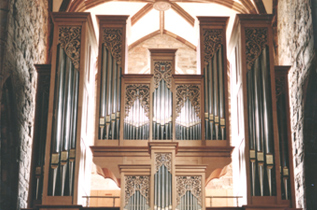 St Mary's Collegiate Church, Haddington
St Mary's Collegiate Church, Haddington
A time-honoured design approach is illustrated here, with each department housed in a separate tonal cabinet for more sound projection in this large medieval building. 24 stops (Great, Chair and Pedal).
St Margaret's Church, Putney, London An asymmetrical location inspired this contemporary design for a compact 2 manual and pedal organ with 13 speaking stops (Great, Echo and Pedal.) |
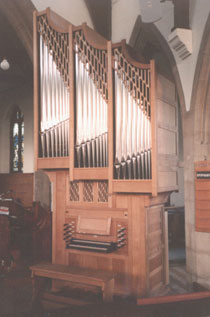 |
| St Joseph's R C Church, Leicester This instrument shows a more traditional design in a gallery location, with carved and gilded pipeshades and featuring a mirror principal facade. 18 stops (Great, Swell and Pedal). New Lammermuir Organ for St. Joseph's R.C.Church Leicester. |
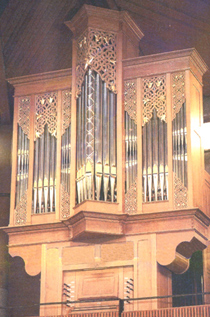 |
| Sherbrooke - St Gilbert's Church, Glasgow Our "magnum-opus" is a comprehensive 3 manual and pedal instrument (Great, Swell, Choir and Pedal) of 34 speaking stops, with a full complement of registrational playing aids. This instrument was designed as a "parish organ". |
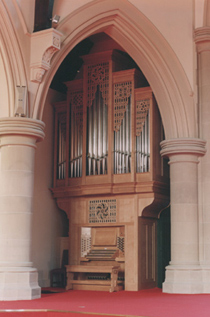 |